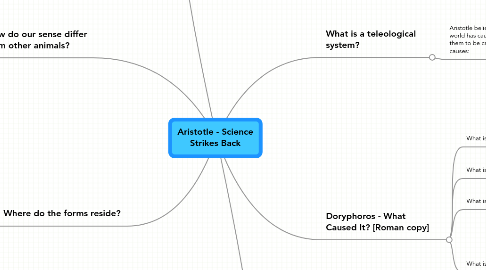
1. Aristotle's Biology
1.1. Metaphysics: "All men by nature desire to know. An example is the delight we take in our senses."
1.2. Aristotle believes that nature is not based on chance - we have been given senses to use them to understand the world.
1.3. For Aristotle, to engage the problem of knowledge, we must begin w/ our senses.
2. How do our sense differ from other animals?
2.1. All forms of life have nutritive, reproductive, and locomotive power.
2.2. Animals differ [from plants] by having the power of sensation and perception.
2.3. More complex animals have intellectual power (problem solving ability)
2.4. Aristotle argues that humans have a special intellectual power called REASON, which is the ability to comprehend universals.
3. How does Aristotle differ from Plato and Socrates?
3.1. Aristotle is a scientific and practical thinker.
3.2. He does not believe in the world of the forms, but thinks that everything that we can understand are the things we can touch.
3.3. He creates and applies a scientific model to philosophical investigation.
4. Where do the forms reside?
4.1. Aristotle believes that the forms lie inside the things themselves
4.2. Each thing that we see is part of a teleological (goal-oriented) system. Our goal: We want to be virtuous and achieve arete - morally perfect.
5. What is a teleological system?
5.1. Aristotle believed that everything in this world has causes (things that drive them to be created). He provides 4 causes:
5.1.1. 1) Material Cause: the material from which the thing is made of
5.1.2. 2) Formal Cause: the shape or form a thing must take in order to be recognized
5.1.3. 3) Efficient Cause: the actual force used to make the thing
5.1.4. 4) Final Cause: what is the ultimate purpose of the thing
6. Doryphoros - What Caused It? [Roman copy]
6.1. What is its material cause?
6.1.1. Marble, stone
6.2. What is its formal cause?
6.2.1. Nude human body, athletic, warrior; contrapposto stance (life-like, in motion); a planner, thinker using reason/strategy before battle, before throwing the spear
6.3. What is its effiecient cause?
6.3.1. Chiseling, carving, shaving
6.4. What is its final cause?
6.4.1. to TEACH (didactic) about Greek virtues (bravery and reason)
6.4.2. To be a role model for all the Athenian young males. He shows perfection: everything every young Athens male must be like
6.4.3. Teaches mathematical porportion / precision
6.4.3.1. Plato: Math = key to heaven; Math = beauty
